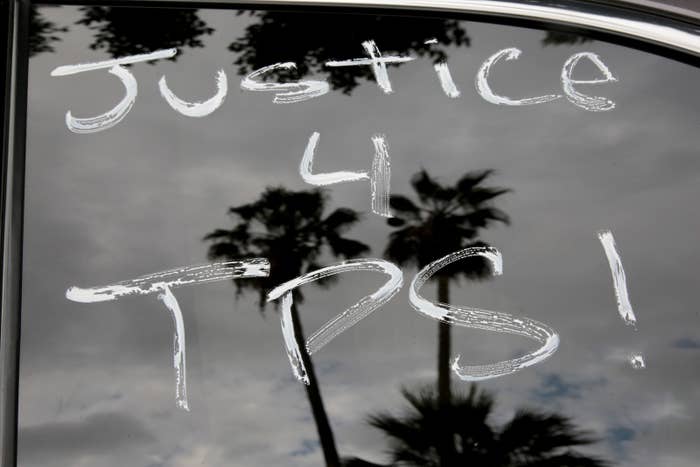
A federal judge in California issued a preliminary injunction Wednesday preventing the Trump administration from ending temporary protected status (TPS) for immigrants from Haiti, El Salvador, Nicaragua, and Sudan.
In his order, US District Judge Edward Chen enjoined and restrained the government from taking any action to end TPS for hundreds of immigrants while a lawsuit challenging the termination of the program moves forward.
Earlier this year, the Trump administration moved to take away TPS for six countries — Honduras, El Salvador, Nicaragua, Haiti, Nepal, and Sudan. TPS recipients from Nepal and Honduras are not covered by Chen's ruling.
Under the TPS designation more than 300,000 immigrants have been allowed to stay and work in the US legally because of dangerous or unsafe conditions in their home countries.
Without the TPS designation, they could be deported.
In making his decision, Chen noted that the termination of TPS for the people covered in the lawsuit would cause indisputable and irreparable harm to the program's recipients and their children, many of them US citizens. The complaint said over 200,000 US citizen children have a parent with TPS.
"Many have US-born children; those may be faced with the Hobson’s choice of bringing their children with them (and tearing them away from the only country and community they have known) or splitting their families apart," Chen wrote. "In contrast, the government has failed to establish any real harm were the status quo (which has been in existence for as long as two decades) is maintained during the pendency of this litigation."
Following the ruling, Devin O’Malley, a spokesperson for the Department of Justice, said the court’s preliminary injunction usurps the role of the executive branch in the US's constitutional order.
“The Court contends that the duly elected President of the United States cannot be involved in matters deciding the safety and security of our nation's citizens or in the enforcement of our immigration laws,” O’Malley said. “The Justice Department completely rejects the notion that the White House or the Department of Homeland Security did anything improper.”
The order also said the suit raised serious questions about whether the Department of Homeland Security's decision to terminate TPS for the six countries was influenced by President Donald Trump's apparent hostility toward nonwhite, non-European immigrants, citing the president's statements about Mexicans, Haitians, and Nigerians, among other examples.
“The court also notes that not only is there direct evidence of animus, but there is also circumstantial evidence of race being a motivating factor,” Chen wrote.
Working Families United, a coalition of immigrant advocacy organizations pushing for an extension of TPS, said the injunction shows that Trump's move to terminate the program was based in his racial motivations and not in any law or consideration of safety.
“With the suit still in court, Congress must act to create a pathway to legal residency and make the protections permanent,” the group said in a statement.
The lawsuit was brought against the government by TPS recipients and their children in March; at the time the administration had only announced it was terminating the program for Haiti, El Salvador, Nicaragua, and Sudan. The plaintiffs include Crista Ramos, a 14-year-old US citizen whose mom is a TPS holder, also a plaintiff, from El Salvador. The complaint claimed that over 200,000 US citizen children have a parent with TPS.
“I was so happy when I found out about the judge’s decision. Ever since the TPS terminations were announced, I have been wondering how I can live a normal life if I am about to lose my mom,” Ramos said in a statement Wednesday. “Today, my family and I are celebrating. Tomorrow, we will continue our fight for permanent status for TPS holders.”
The plaintiffs are represented by the National Day Laborer Organizing Network, the ACLU Foundation of Southern California, and the law firm Sidley Austin LLP.
